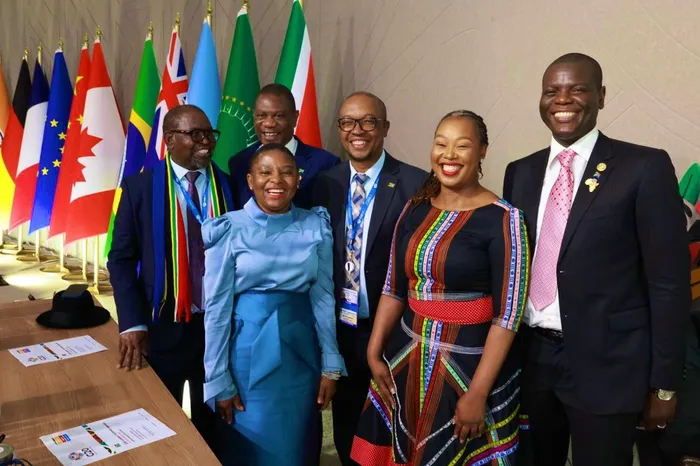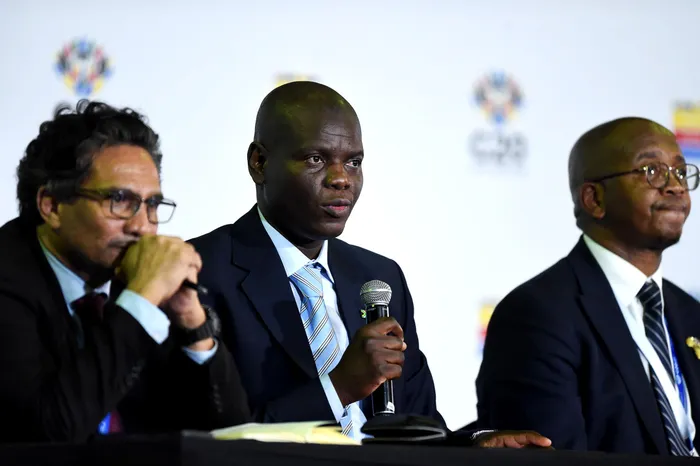G20 Summit Day 2: Khumbudzo Ntshavheni says South Africa has put African agenda firmly on the map

Minister in the Presidency Khumbudzo Ntshavheni said South Africa has proudly put the African agenda firmly on the table, as it prepares to hand over the G20 presidency to the United States.
Image: Khumbudzo Ntshavheni/ X
Johannesburg has entered the second and final day of the historic G20 Leaders’ Summit with momentum, tension and a renewed sense of global focus after a dramatic and symbol-rich opening day at the Nasrec Expo Centre.
South Africa made a powerful statement on Day 1, with President Cyril Ramaphosa welcoming heads of state with firm handshakes, smiles and a strong reminder that “nothing should diminish the value, the stature and the impact” of the first G20 summit ever held on African soil.
His opening address emphasised multilateralism, cooperation and Africa’s central role in shaping global solutions — a theme likely to continue dominating today’s discussions.
On Sunday, Minister in the Presidency Khumbudzo Ntshavheni said South Africa has proudly put the African agenda firmly on the table, as it prepares to hand over the G20 presidency to the United States.
"For us, our success is that we have put the African agenda on the map. Africa is mentioned in the declaration for the first time, and perfectly so that we are on African soil. It is mentioned 80 times in the declaration, for those who counted. The agenda addresses African priorities and African challenges. Not only Africa, but those of the developing world," Ntshavheni said in an interview with Newzroom Afrika.
"Africa, it is our time, we have demonstrated our capacity as an equal on behalf of all African nations."
US absence casts a shadow
A major sore point heading into Day 2 remains the United States’ absence at the summit. As IOL has reported extensively, Pretoria formally marked the US as “absent” after Washington attempted to send its chargé d’affaires to receive the G20 presidency — something South Africa deemed a breach of protocol.
International Relations Minister Ronald Lamola has clarified that South Africa did not deny the US access but insisted that the presidency handover must be performed at the correct diplomatic level.
The tension, amplified by earlier remarks from the White House accusing Ramaphosa of “running his mouth,” continues to shape the political atmosphere around the summit.
While other international outlets have noted the wider geopolitical implications of the US no-show, the practical effect is that Sunday's closing engagements will proceed without America’s direct participation at leader or minister level.

Department of International Relations and Cooperation Director General Zane Dangor, Minister of International Relations and Cooperation Ronald Lamola briefed the media on Saturday.
Image: Itumeleng English/Independent Newspapers
Security dominates the Johannesburg backdrop
Security remained one of the biggest stories of Day 1. IOL reporters at the summit witnessed SAPS pushing back crowds of uMkhonto weSizwe members and Operation Dudula activists who attempted to move closer to the Nasrec precinct. Protesters accused police of violating their constitutional rights, while SAPS stated the groups were attempting to block motorcades of heads of state.
The tension escalated when police used teargas and pepper spray, leaving Operation Dudula leader Zandile Dabula in visible distress and sending at least one SAPS officer to the hospital after clashes. Two protesters were arrested, and public violence charges are being investigated.
With delegations continuing to move between venues today, the tight security footprint — including road closures, aerial monitoring, and the presence of specialised SAPS units — is expected to intensify.
Diplomatic theatre meets continental expectations
Day 1 was rich with symbolic moments beyond the protests. UN Secretary-General António Guterres and Turkey’s President Recep Tayyip Erdoğan were among the prominent arrivals, each engaging with Ramaphosa in carefully choreographed red-carpet greetings.
Inside the summit, delegates worked through positions on global growth, debt relief, energy transitions and sustainable development. South Africa signalled pride at having coordinated a consensus around the G20 outcome document, with Ramaphosa saying the summit should leave the world with a sense that the G20 has been “strengthened.”
As the sun rose over the City of Johannesburg, anticipation had build — not just for the outcomes penned in meeting rooms, but for how the world will remember this summit and Africa’s place at its centre.
jonisayi.maromo@iol.co.za
IOL News